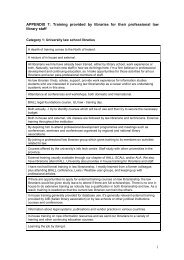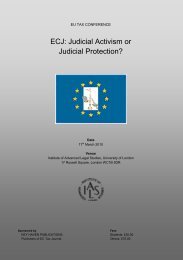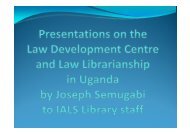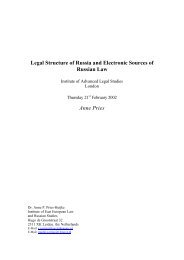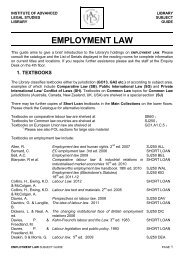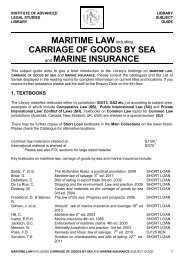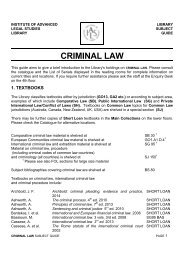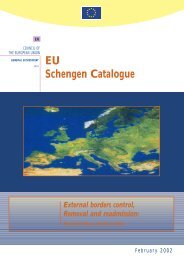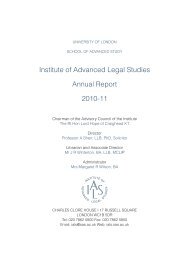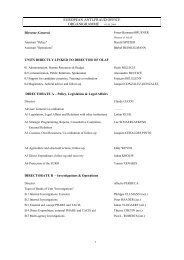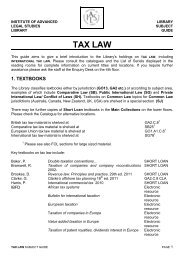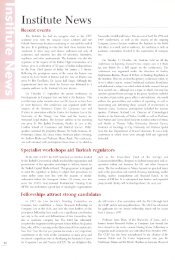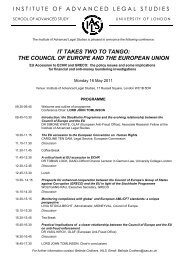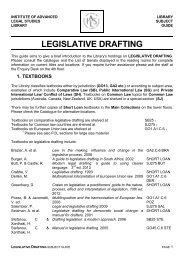a thesis - Institute of Advanced Legal Studies
a thesis - Institute of Advanced Legal Studies
a thesis - Institute of Advanced Legal Studies
You also want an ePaper? Increase the reach of your titles
YUMPU automatically turns print PDFs into web optimized ePapers that Google loves.
INVALIDATING CAUSES. 81<br />
ment is not void. Ex parte Mercer, In re Wise (1886), 17<br />
Q. B. D. 290.<br />
Trusts void under the .Bankruptcy Acts.—By s. 47 <strong>of</strong> the Bankruptcy<br />
Act, 1883, it is provided that:—<br />
(1) Any settlement <strong>of</strong> property, not being a settlement made<br />
before and in consideration <strong>of</strong> marriage, or made in favour <strong>of</strong> a<br />
purchaser or incumbrancer in good faith and for valuable consideration,<br />
or a settlement made on or for the wife or children <strong>of</strong><br />
the settlor <strong>of</strong> property which has accrued to the settlor after<br />
marriage in right <strong>of</strong> his wife, shall, if the settlor becomes bankrupt<br />
within two years after the date <strong>of</strong> the settlement, be void<br />
against the trustee in the bankruptcy, and shall, if the settlor<br />
becomes bankrupt at any subsequent time within ten years after<br />
the date <strong>of</strong> the settlement, be void against the trustee in the<br />
bankruptcy, unless the parties claiming under the settlement can<br />
prove that the settlor was, at the time <strong>of</strong> making the settlement,<br />
able to pay all his debts without the aid <strong>of</strong> the property comprised<br />
in the settlement, and that the interest <strong>of</strong> the settlor in such<br />
property has passed to the trustee on the execution there<strong>of</strong>.<br />
(2) Any covenant or contract made in consideration <strong>of</strong> marriage<br />
for the future settlement on or for the settlor's wife or children <strong>of</strong><br />
any money or property wherein he had not, at the date <strong>of</strong> his<br />
marriage, any estate or interest, whether vested or contingent in<br />
possession or remainder, and not being money or property <strong>of</strong> or in<br />
right <strong>of</strong> his wife, shall, on his becoming bankrupt before the<br />
property or money has been actually transferred or paid pursuant<br />
to the contract or covenant, be void against the trustee in bankruptcy.<br />
(3) "Settlement" shall, for the purposes <strong>of</strong> this section, include<br />
any conveyance or transfer <strong>of</strong> property.<br />
It has been held that the word " void " in the section should be<br />
read as " voidable," so that a purchaser <strong>of</strong> the property comprised<br />
in the settlement before the trustee's title has accrued cannot be<br />
disturbed. (In re Vansittart, (1893) 2 Q. B. 377; In re Carter<br />
and Kenderdine's Contract, (1897) 1 Oh. 776; In re Tankard, Ex<br />
parte the Official Receiver, (1899) 2 Q. B. 57.)<br />
Trusts in Fraud <strong>of</strong> Purchasers.—Trusts <strong>of</strong> land may be void<br />
against subsequent purchasers <strong>of</strong> the land under 27 Eliz. c. 4.<br />
S. 2 <strong>of</strong> this statute provides that "every conveyance, grant,<br />
H. G



